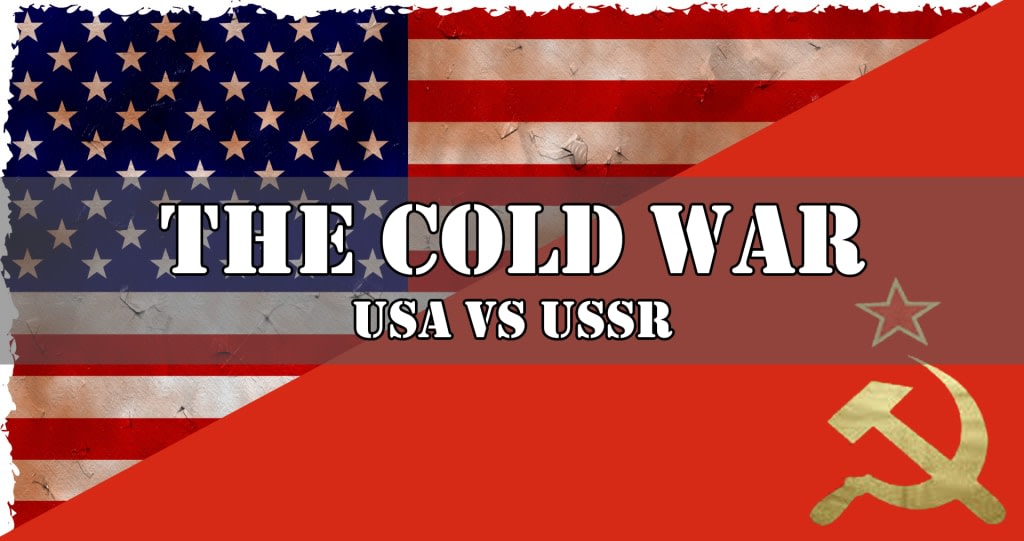COLD WAR: IMPACTS ON THE WORLD AND SOUTH ASIA
USSR Vs USA Tussle

" There is nothing permanent but change " (Heraclitus) but it goes with saying that change might be stagnant for sometimes, but war is permanent there is no way to overcome it and peace is just the preparation for another war. It is believed that Cold War has been started in after WWII but that was its actual emergence but nonetheless it is stated that during 1917 Soviet Union’s Revolution under Vladimir Lenin Cold war was initiated.
Although USSR was an emerged state after 1917 but US did not recognized it until 1933 when it became the world’s major economic power, during this era Germany was rising again. Cold War was the tussle between capitalism and communism regime, US wanted to dominant its capitalism system on whole world while Soviet Union wanted to pursue its communism idea to other nations. After WWII ended in 1945 Germany was divided into two parts, Japan was in bad shape as it was nuked by US at Hiroshima and Nagasaki during WWII, although UK was the triumphed side, but it was exhausted. So, the world changed its trajectory to bipolarity from Multipolarity as only two supreme power left in the world, the United States, and the Soviet Unions. That where Cold War ignited.
Why it is called Cold War, not Hot War? Because it was war without a bullet. The war was fully economically based, one power wanted to cripple another economically so then collapse is assured but nevertheless it was hot war for the rest of the world. Before 1949 US had monopoly in Nuclear weapon but in 1949 Soviet Union had also conceived nuclear weapon that neutralized the monopoly power of US and that’s why US never dared to nuke the Soviets as they did with the japan.
With growing power of Soviet, US felt threat by communism as Soviets were pure communist. Communism blows the idea that “All people are equal” gives by Karl Marks who was big philosopher and despiser of capitalism regime because he thought poverty is caused by capitalism. It the system of money flowing from riches to the riches. The world’s 80% wealth is in the hands of 1 % people of the world that is truly blessing of capitalism. If this wealth is taken from them and distributed among world’s population then every person share would be almost 5000 USD. After Soviet Union revolution, communism became more popular in colonized nation because they were annoyed of their colonial rulers.
In 1949 occurrence of Revolution in china under Mao Zedong made that year critical year for communism as two largest countries in the world, one by area Russia (17.1 Million Km2) and China by population (1.393 Billion - 2018) were communism regime and they both had dominancy in Asia.
After 1945 decolonization wave was started, Pakistan independence, African countries got rid of colonial rule, Indonesia, and other countries got their independence then both Soviet Union and US wanted to orchestrate their so-called systems in other countries. United States made an alliance with Europe countries with name of NATO (North Atlantic Treaty organization) in 1949 to contain communism. Under this treaty in case of any intervention to any NATO allied country by external force, US would certainly answer them. To encounter this action of US, Soviet Union made Warsaw Pact in 1955 which included one Muslim Europe country Albania. (Albania then withdrew in 1968). To encounter communism from spreading US made another two alliances SEATO for South East Asian countries and CENTO for middle east countries
United States and Soviet Union carried out several proxy wars in the arena of cold war, and they had their fingers in every pie. In 1950 Korean War started, North Korea intervened in South Korea and encroached Seoul (South Korea’s capital). South Korea was allied with US so they urged 16 those countries which were under the thumb of US to send their army to curb the assault of North Korea and the army was almost 10 Lakhs and North Korean was fell backed from Seoul and then Soviet Union urged china to send its army to north Korea to beat out the south Korean and its allies and china with 5 lakh army shackled south Korea. Both powers were actively engaged in this war. One the major event of cold war. Both US and Soviet Union had foul play with the world, and they were so obdurate for their own personal agendas.
In around 1960 an American aero plane U2 “Spy in the Sky” taken off from Peshawar to spy on Russian’s nuclear installments and take pictures of them. It was believed by US army that Soviet Union’s Radar won’t trace it as it could fly at altitude of 70,000 feet but eventually the Soviet’s watchdog was impressive, and they managed to destroy the aero plane and captured the pilot.
Cuba missile Crisis, Vietnam War (Nov 1, 1955 – Apr 30, 1975) were some other crucial events of Cold War. After that they made an agreement MAD (Mutually assured destruction) that meant they would inform each other before doing any nuclear activity against each other and they agreed on a policy to decrease tension named “DÉTENTE”
In South Asia context cold war had relentless impact on India and Pakistan’s domestic and foreign affairs. One of the Ex-Psychological warfare expert of KGB Yuri Bezmenov declassified some serious revelations in his book “Deception is my Job “. He said KGB bribed an Indian newspaper with 1 Million USD to support communism and Indira Ghandi (PM of India) as Nehru’s Dynasty was keen believers of communism. He also revealed Lal Bahadar Sastri’s (2nd PM of India) mysterious death during Indus water treaty agreement between Pakistan and India at Tashkent in 1966.In 1991 Cold War ended after overwhelming defeat of Soviet Union in Afghanistan as Soviet Union was domestically and economically so weak that they cannot afford to continue the war. Fifteen sovereign republics emerged from the collapse of the Union of Soviet Socialist Republics (USSR): Russia, Ukraine, Belarus, Moldova, the three Baltic Republics (Latvia, Lithuania, Estonia), the three Caucasian Republics (Georgia, Armenia, Azerbaijan) and the Central Asia Republics (K).
About the Creator
Engr. Muhammad Waseem Khan
Hey. This is Muhammad Waseem Khan. I am a content writer .






Comments
There are no comments for this story
Be the first to respond and start the conversation.